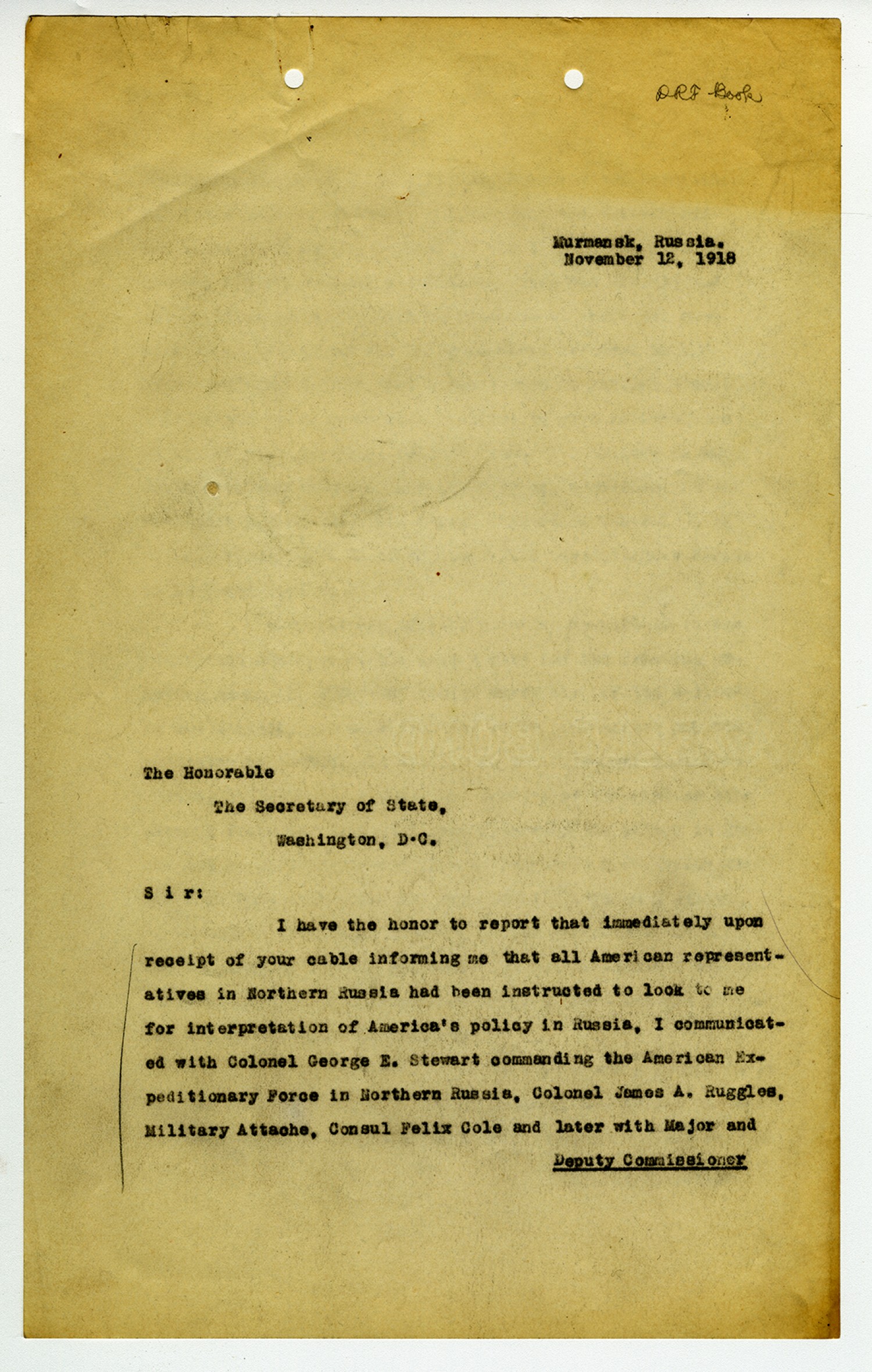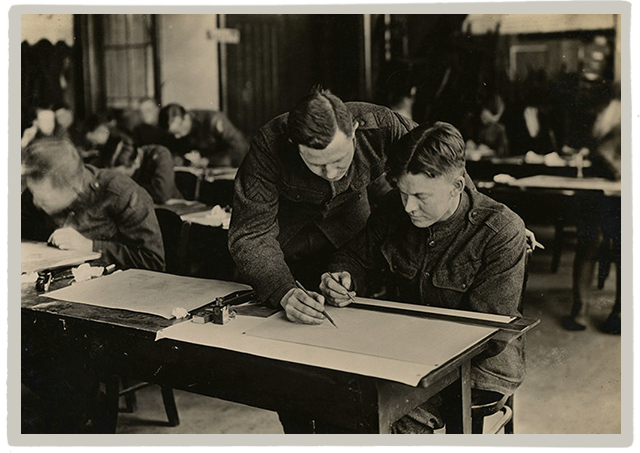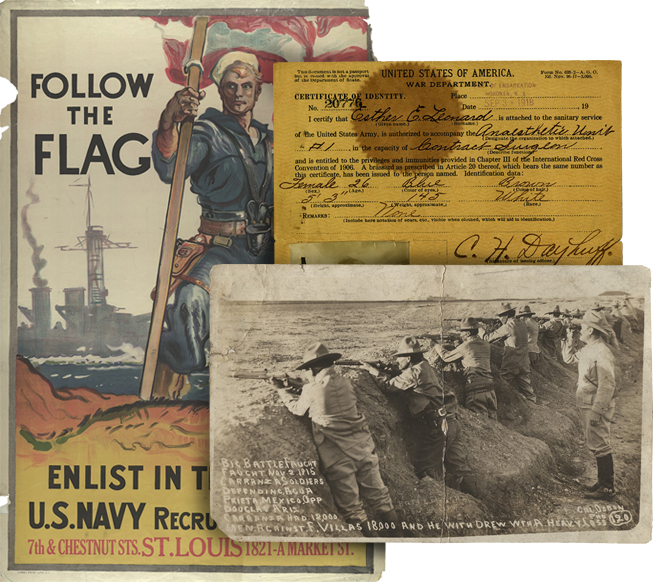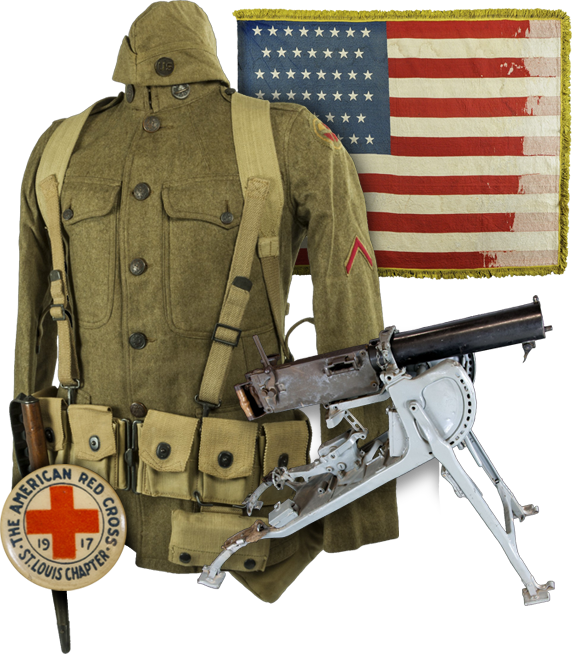David R. Francis letter to Robert Lansing. - November 12, 1918

Transcript
Murmansk, Russia November 12, 1918 The Honorable The Secretary of State, Washington, D.C. Sir: I have the honor to report that immediately upon receipt of your cable informing me that all American representatives in Northern Russia had been instructed to look to me for interpretation of America
Description
David R. Francis letter to Robert Lansing. - November 12, 1918

Transcript
S.S. [Page 2] Deputy Commissioner C. T. Williams, Chief of the American Red Cross Mission to Russia and Mr. Crawford Wheeler and Mr. Allen M. Craig at the head of the Y. M. C. A. work in Russia, regarding their activities. They had already had instructions to confer with me received at about the same time as my receipt of the telegram above referred to and after conferences with them I found them in perfect accord with me and while I was in a position to give instructions to all of them excepting Colonel Stewart, I believe he too would have obeyed any orders given by me, regardless of the fact that he was under the direct command of General F. W. Poole, Commander in Chief of the Allied Expeditionary Forces in Northern Russia. I have already written detailed despatches to the Department relative to the coup d
Description
David R. Francis letter to Robert Lansing. - November 12, 1918

Transcript
S.S. [Page 3] over the situation on that front: stating that the morale of the French troops was very bad; that because thereof, the American troops were in a more or less exposed condition and that there were insufficient troops, lack of proper supervision and direction and attention by the British commanding officers and ending with the statement that our policy was not clear to either American officers or men. Immediately upon receipt of this letter I talked to Military Attache Ruggles and suggested that he go to the front. He did not go himself but sent one of the members of his mission, Lieutenant Bukovski, who stayed but a short time, one day, if I remember correctly; but his visit did not accomplish the desired results. On October 24th I received another letter from Major Nichols brought by Lieut. Bukovski, stating that the situation was serious, that there was disaffection among the French troops and that the American soldiers were becoming inoculated with the spirit of the French; that the troops were not properly protected on their line of defense and that he was in receipt of a communication from his Headquarters urging him to appeal to the soldiers and their duty to their government to obey all orders given. Major Nichols again urges that the Military Attache be sent down to the front. On [October] 26th I received another communication from Major Nichols of the same date stating that the command of the forces on the railroad front was to be turned over to a French Colonel. He again dilates on the dangerous situation of our troops and again asks that the Military Attache be sent down. Having received no definite response to my repeated suggestions to Colonel Ruggles to go to the front, and upon receipt of this
Description
David R. Francis letter to Robert Lansing. - November 12, 1918

Transcript
S.S. [Page 4] [receipt] of this communication, I immediately wrote theron
Description
David R. Francis letter to Robert Lansing. - November 12, 1918

Transcript
S.S. [Page 5] Baroness Accurti, a great friend of General Poole
Description
David R. Francis letter to Robert Lansing. - November 12, 1918

Transcript
[S.S. letterhead] [Page 6] [embarkation] on the Olympia. Admiral McCully had also decided to go to the front with Colonel Ruggles. For a number of days I had been considering the situation at the front, the morale of our soldiers and the reported fact that if an armistice were declared, none of the French troops and probably only some of the Americans would continue to fight against the Bolsheviks. The Bolsheviks had been distributing by some means bolshevik propaganda among the Allied troops and probably with absolutely no effect. Both because of the situation at the front and the fact that I was contemplating leaving Russia and did not publish the fact for fear it would create an additional unrest or panic, I decided to make an address to the troops coincident with my departure from Russia. After some days of preparation I completed this address, and I have the honor to enclose attached hereto, copies thereof with a number of corrections therein. I gave orders to have this printed and a number of copies given to Colonel Ruggles, Colonel Stewart, Admiral McCully, Major Williams of the Red Cross and Mr. Crawford Wheeler of the Y. M. C. A.: also to have same translated and given publicity through the local branch of the Committee on Public Information under the direction of Mr. Read Lewis. On Tuesday, November 5th, I formally notified Mr. DeWitt C. Poole, Jr. of his assignment as Special Assistant to the Ambassador with the rank of Counselor and that he should act as Charge d
Description
David R. Francis letter to Robert Lansing. - November 12, 1918

Transcript
S.S. [Page 7] until the morning of the 8th and waited at the bar until the morning of the 9th whence we cleared for Murmansk where we arrived on the morning of the 11th and immediately proceeded to coal. We expect to clear from here today the 12th and probably will arrive in England on the 17th. Through the courtesy of Admiral Kemp who is being relieved by a British Admiral Greene, who is expected to arrive today, I yesterday sent a message by wireless (through balloon serials from the British Cruiser Glory) to the American Embassy London (via Aberdeen) concerning my departure from here. I presume that the American Embassy in London has duly advised the Department thereof. I have heard conflicting reports concerning the return of General Poole. Both General Ironside and Commissioner Lindley when talking to me on board the Olympia on the 6th asked me where I had heard that Poole would be back as a Lieut. General and when I asked them if it had not come from them they both denied having received any notification thereof. Admiral Kemp told me confidentially yesterday that General Poole was not aboard of the Steamer due here this afternoon and he (Admiral Kemp) intimated that General Poole was being held in London awaiting my arrival there. The armistice was reported signed yesterday morning and today we have the details thereof which places a time limit of 36 days or a little over five weeks thereon. I trust that ere this time limit expires I will be able to resume active duties and possibly have some part in the great Peace Conference which much of necessity involve all political issues extant and be of long duration. Certainly the terms of the armistice
Description
David R. Francis letter to Robert Lansing. - November 12, 1918

Transcript
S.S. [Page 8] armistice are all that could be desired and amount to a practical unconditional surrender on the part of Germany. I shall advise the Department immediately upon my arrival in England of my future plans and trust I will there receive cables from the Department with any instructions which it may deem wise to give. I have the honor to be, Sir, Your obedient servant, P.S. December 31st I dictated the foregoing despatch while enroute to London from Archangel. Have learned since from my Secretary and my Valet Phil. that during the voyage I was talking to some people whom I had left in Archangel and to others who were not on the boat, consequently I must have been wandering in my mind, but if so, I was not aware of it at the time and it was my physician tells me due to my high fever. After reading the foregoing despatch carefully and while it states facts and occurrences as they were, I feel that I should not send it without a postscript of explanation as it apparently reflects upon my Military Attache, Colonel James A. Ruggles, who is a good soldier and loyal to his country and his Chief. When I manifested impatience at his ailure to obey my instruction to go to the front, as I did two or three days after I had given him the order, he remarked that he had not been well, having been threatened with influenza. While that was sufficient excuse, I felt that he should have explained his failure to follow my instruction especially as it was qualified with the word
Description
David R. Francis letter to Robert Lansing. - November 12, 1918
Details
| Title | David R. Francis letter to Robert Lansing. - November 12, 1918 |
| Creator | Francis, David R. |
| Source | Francis, David R. Letter to Robert Lansing. 12 November 1918. Francis, David Rowland Collection. A0519. Missouri History Museum, St. Louis, Missouri. |
| Description | David R. Francis wrote to Robert Lansing the Secretary of State about events that occurred in Russia and discussed the French and American soldiers who fought the Bolsheviks. David Rowland Francis came to St. Louis in 1866. He served as mayor of St. Louis from 1885 to 1889 and governor of Missouri from 1889-1893. Francis was also the American Ambassador to Russia during WWI. |
| Site Accession Number | A0519 |
| Contributing Institution | Missouri History Museum |
| Copy Request | Transmission or reproduction of items on these pages beyond those allowed by fair use requires the written permission of the Missouri History Museum: 314-746-4510 |
| Rights | The text and images contained in this collection are intended for research and educational use only. Duplication of any of these images for commercial use without express written consent is expressly prohibited. Contact the Missouri History Museum's Permissions Office at 314-746-4511 to obtain written consent. |
| Language | English |



